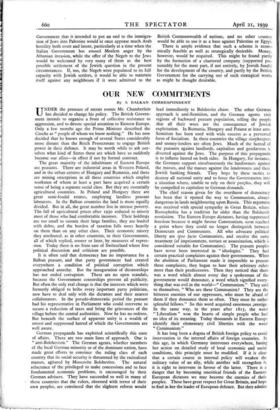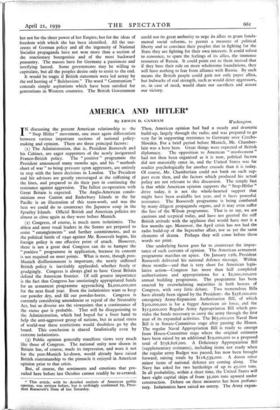OUR NEW COMMITMENTS
By A BALKAN CORRESPONDENT
UNDER the pressure of recent events Mr. Chamberlain has decided to change his policy. The British Govern- ment intends to organise a front of collective resistance to aggression, and to devote special attention to Eastern Europe. Only a few months ago the Prime Minister described the Czechs as "people of whom we know nothing." He has now decided that he knows enough of several States considerably more distant than the Reich Protectorate to engage British power in their defence. It may be worth while to ask our- selves what kind of States these are which have so suddenly become our allies—in effect if not by formal contract.
The great majority of the inhabitants of Eastern Europe are peasants. There are industrial areas in Western Poland, and in the urban centres of Hungary and Rumania, and there are mining enterprises in all these countries which employ workmen of whom at least a part have acquired a certain sense of being a separate social class. But they are essentially agricultural countries. In Poland and Hungary there are great semi-feudal estates, employing landless peasant labourers. In the Balkan countries the land is more equally divided. But in all, the great number live in intense poverty. The fall of agricultural prices after 1930 reduced to misery most of those who had comfortable incomes. Their holdings are too small to sustain their large families, they are loaded with debts, and the burden of taxation falls more heavily on them than on any other class. Their economic misery they attributed, as in other countries, to their Governments, all of which replied, sooner or later, by measures of repres- sion. Today there is no State east of Switzerland where free political discussion and criticism are possible.
It is often said that democracy has no importance for a Balkan peasant, and that party government had created everywhere a condition of political corruption which approached anarchy. But the inauguration of dictatorships has not ended corruption. There are no open scandals, because the Government censorships prevent all publicity. But often the only real change is that the interests which were formerly obliged to bribe every important party politician, now have to deal only with the dictators and their nearest collaborators. In the pseudo-democratic period the peasant - had his representative in Parliament who could intervene to secure a reduction of taxes and bring the grievances of the village before the central authorities. Now he has no redress. But beneath the surface of apparent unity is a wealth of unrest and suppressed hatred of which the Governments are well aware.
German propaganda has exploited scientifically this state of affairs. There are two main lines of approach. One is "anti-Bolshevism." The German agents, whether members of the local German minority or of the dominant nation, have made great efforts to convince the ruling class of each country that its social security is threatened by the radicalised masses, agitated by Muscovite Bolshevists. The natural reluctance of the privileged to make concessions and to face fundamental economic problems, is encouraged by their German advisers. They have succeeded so well in many of , these countries that the rulers, obsessed with terror of their own peoples, are convinced that the slightest reform would lead immediately to Bolshevist chaos. The other German approach is anti-Semitism, and the Getman agents visit regions of backward peasant population, telling the people that all their woes are the consequence of Jewish exploitation. In Rumania, Hungary and Potanct at least anti- Semitism has been used with wide success as a perverted form of Socialism. In these countries the village shopkeepers and money-lenders are often Jews. Much of the hatred of the peasants against landlords, capitalists and gendarmes is diverted against the Jews. The purpose of this propaganda is to inflame hatred on both sides. In Hungary, for instance, the Germans support simultaneously the landowners against the masses, and the masses against the landowners and their Jewish banking friends. They hope by these tactics to destroy all national unity and to force the Governments into a situation where, unable to rely on their peoples, they will be compelled to capitulate to German demands.
The chief reason given for the overthrow of democracy has been that it opened the way to Communism, always dangerous in lands neighbouring upon Russia. This argument was received with special sympathy in Great Britain, where Russophobia has a tradition far older than the Bolshevik revolution. The Eastern Europe dictators, having suppressed freedom because it might favour Communism, soon reached a point where they could no longer distinguish between Democrats and Communists. All who advocate political liberty are ipso facto Communists, and receive the same treatment (of imprisonment, torture or assassination, which is considered suitable for Communists). The peasant peoples have never been interested in "ideologies." They had certain practical complaints against their governments. When the abolition of Parliament made it impossible to present these complaints, they began to hate their arbitrary rulers more than their predecessors. Then they noticed that there was a word which almost every day a spokesman of the government would denounce, a word which signified every- thing that was evil in the world—" Communism." They said to themselves, "Who are these Communists? They are the bitterest enemies of our oppressors, who must be afraid of them if they denounce them so often. They must be rather splendid fellows." So this word acquired enormous prestige. In the same way, in the years after 1815, the word " Liberalism " won the hearts of simple people who had no idea of its meaning. Today thousands in Eastern Europe identify their elementary civil liberties with the word "Communism."
It has long been a dogma of British foreign policy to avoid intervention in the internal affairs of foreign countries. In this age, in which Germany intervenes everywhere, basing her action on detailed study of local economic and social conditions, this principle must be modified. If it is clear that a certain course in internal policy will weaken the military value of an ally, while another will strengthen it, it is right to intervene in favour of the latter. There is a danger that by becoming uncritical friends of the Eastern European dictators we may become the enemies of their peoples. These have great respect for Great Britain, and hope to find in her the leader of European defence. But they admire her not for the sheer power of her Empire, but for the ideas of freedom with which she has been identified. All the suc- cesses of German policy and all the ingenuity of National Socialist propaganda have not won more than a section of the reactionary bourgeoisie and of the most backward peasantry. The masses have for Germany a passionate and terrifying hatred. Some governments may be willing to capitulate, but all the peoples desire only to resist to the end.
It would be tragic if British statesmen were led astray by the red herring of " Bolshevism." The word " Communism" conceals simple aspirations which have been satisfied for generations in Western countries. The British Government could use its great authority to urge its allies to grant funda- mental social reforms, to permit a measure of political liberty and to convince their peoples that in fighting for the State they are fighting for their own interests. It could refuse to renounce, to spare the feelings of its allies, the immense resources of Russia. It could point out to them instead that if they base their rule on more wholesome foundations, they will have nothing to fear from alliance with Russia. By such means the British people could gain not only paper allies, but bulwarks of real strength, such as would deter aggressors, or, in case of need, would share our sacrifices and assure our victory.











































 Previous page
Previous page